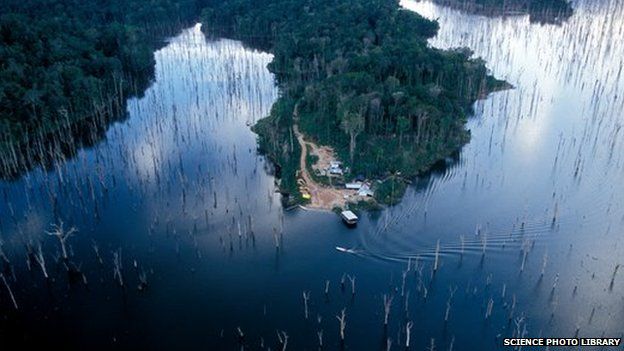Gold rush threat to tropical forests
- Published

Global demand for gold is putting some of the most remote and pristine tropical forests at risk, scientists warn.
Some 1,680 sq km of rainforest in South America was lost to gold mining from 2001 to 2013, a study shows.
University of Puerto Rico researchers say gold mining has become a major threat to ancient rainforests in countries such as Peru and Suriname.
Consumers can help by buying only fair-trade gold, say environmentalists.
The research, published in Environmental Research Letters, studied tropical forests across South America below 1,000m, covering Colombia, Venezuela, Guyana, Suriname, French Guiana, Brazil, Ecuador, Peru, and Bolivia.
Satellite images show forest clearance for gold mining accelerated after the international financial crisis of 2007.
It was concentrated in four main areas - the Guianan forests; the Southwest Amazon in Peru; the Tapajos-Xingu forest in Brazil; and Magdalena Valley-Uraba in Colombia.
Overall, the amount of forest lost was less than 1% but much of it was located in or near conservation areas.
"Although the loss of forest due to mining is smaller in extent compared to deforestation caused by other land uses, such as agriculture or grazing areas, deforestation due to mining is occurring in some of the most biologically diverse regions in the tropics," said lead researcher Nora Álvarez-Berríos.
Global gold production has increased from around 2,445 tonnes in 2000 to around 2,770 tonnes in 2013, while prices have soared.
This has made it profitable to mine in areas such as the soil beneath tropical forests.
The removal of vegetation and development of roads and railways can have long-term impacts, say the scientists.
Gold mining can also create pollutants such as mercury, which can enter rivers and the atmosphere.
Consumer power
Dr Susanne Schmitt of WWF called for better mining laws and awareness and training to reduce the impact of gold mining on forests and to improve local people's livelihoods.
Consumers could also help when purchasing gold, she added.
"By insisting on fair trade gold when purchasing jewellery of other gold products consumers have real power in ensuring that this unfair and environmentally damaging practice ends, to be replaced with a longer term industry providing jobs and security to communities without destroying their environment."
- Published17 September 2013